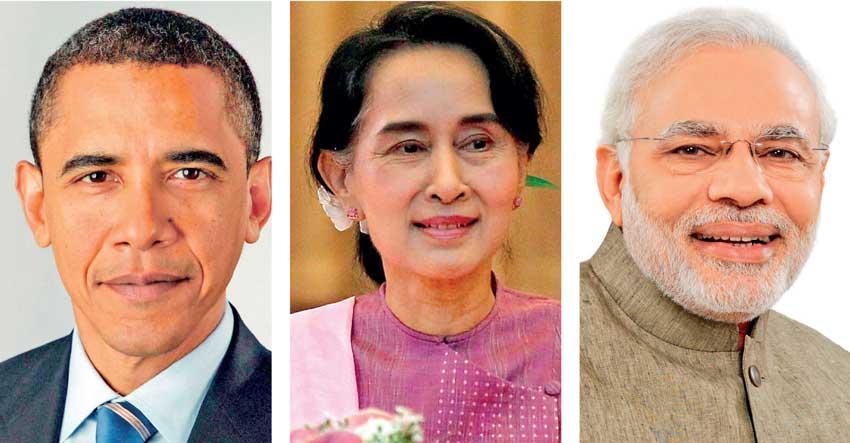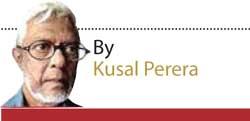Reply To:
Name - Reply Comment

 Two Nobel Peace Prize laureates have thus far disappointed me to the core. First was Barack Obama. Awarding of the Nobel Peace Prize to him was shockingly surprising. Swearing in as the 44th President of the US on January 20, 2009, he wasn’t in the White House for even 10 months when on October 9 he was decided for the 2009 Nobel Peace Prize “for his extraordinary efforts to strengthen international diplomacy and cooperation among people.” That had no meaning when he continued with the Iraqi war he pledged to conclude. No meaning when the US forces were allowed to use drones in Afghanistan and were held responsible for civilian deaths due to drone attacks. It was a far cry when the Obama administration decided in 2011 to support “rebel forces” in the Syrian civil war with weapons, training and funding. His “strengthening of international diplomacy” during 2012-2013 led to Saudi Arabia, the UK, France, the Netherlands, Norway, Israel and few others joining to support rebel groups in the Syrian civil war. The weeping and bleeding massive human tragedy it led to needs no details. My disappointment aside, his presidency with all praise and respect earned, gave way to “White Supremacy” in US politics and perhaps would decide US politics at the next presidential election too.
Two Nobel Peace Prize laureates have thus far disappointed me to the core. First was Barack Obama. Awarding of the Nobel Peace Prize to him was shockingly surprising. Swearing in as the 44th President of the US on January 20, 2009, he wasn’t in the White House for even 10 months when on October 9 he was decided for the 2009 Nobel Peace Prize “for his extraordinary efforts to strengthen international diplomacy and cooperation among people.” That had no meaning when he continued with the Iraqi war he pledged to conclude. No meaning when the US forces were allowed to use drones in Afghanistan and were held responsible for civilian deaths due to drone attacks. It was a far cry when the Obama administration decided in 2011 to support “rebel forces” in the Syrian civil war with weapons, training and funding. His “strengthening of international diplomacy” during 2012-2013 led to Saudi Arabia, the UK, France, the Netherlands, Norway, Israel and few others joining to support rebel groups in the Syrian civil war. The weeping and bleeding massive human tragedy it led to needs no details. My disappointment aside, his presidency with all praise and respect earned, gave way to “White Supremacy” in US politics and perhaps would decide US politics at the next presidential election too.
The other Nobel Peace Prize laureate, who I firmly believed was well-deserving, is more than a disappointment after 28 years. In 1991, Aung San Suu Kyi was under detention held by the military junta when she was awarded the Nobel Peace Prize “for her non-violent struggle for democracy and human rights.” She did achieve democracy and human rights to a fair degree for the Burmese Buddhists with her National League for Democracy (NLD) bringing an end to military rule after over 50 years with a landslide victory at the 2015 November elections.
With her new freedom since 2010 and becoming the opposition leader after the restricted elections in 2012, she was Myanmar’s rising power within the transition to democratic rule. She was thus interviewed in October 2013 by BBC’s Mishal Husain on her role and her party. She was uneasy with Husain questioning her on the Rohingya Muslim issue. There was every sign of ethnic cleansing claimed international rights groups. After the interview, Suu Kyi was quoted as telling one of her aides, “No one told me I was going to be interviewed by a Muslim” (https://www.vox.com/2016/3/28/11306856/aung-san-suu-kyi-muslim-rohingya-bbc).
Six years later on December 11, 2019, she was before the International Court of Justice (ICJ) responding to a case filed by The Gambia with support from the 57 member Organisation of Islamic Corporation (OIC), accusing Myanmar of genocide against Rohingya Muslims. In her half hour response, Suu Kyi refrained from using the term “Rohingya Muslims.” She and her government keep the ethnic identity of Rohingya Muslims out of Myanmar politics, calling them “Rakhine people” or “Members of Rakhine communities” and at times calling them just “Muslims.” She stressed at the ICJ: “We are, however, dealing with an internal armed conflict, started by coordinated and comprehensive attacks by the Arakan Rohingya Salvation Army (ARSA) to which Myanmar’s Defence Services responded.” That being the only time she used the word “Rohingya.”
She told ICJ: “But one thing surely touches all of us equally: the sufferings of the many innocent people whose lives were torn apart as a consequence of the armed conflicts of 2016 and 2017, in particular, those who have had to flee their homes and are now living at camps in Cox’s Bazar.” So, it is the “armed conflicts of 2016 and 2017 in particular” between ARSA and the Myanmar military that had displaced “many innocent people” who are “now living in camps in Cox’s Bazar”.
In all these countries, the larger majority of the peasantry are ethno-religiously of the majority ethnic or religious group of the country. In India, it is a Hindu religious majority. In Pakistan and Bangladesh, it is Islamic majority and in Myanmar and Sri Lanka, it is Buddhist. These are large numbers that count in electoral politics
How many innocents does Aung San Suu Kyi mean? This is what the UN Refugee Agency,UNHCR, says on its website. “Rohingya refugees fled violence in Myanmar at a staggering rate in 2017 – and the numbers keep growing.” The website says: “742,000 refugees have fled to Bangladesh since August 25, 2017.” This is a description of the human tragedy the UNHCR spells out. “The vast majority reaching Bangladesh are women and children, and more than 40 per cent are under the age of 12. Many others are elderly people requiring additional aid and protection. They have nothing and need everything... The Kutupalong refugee settlement has grown to become the largest of its kind in the world, with more than 600,000 people living in an area of just 13 square kilometres, stretching infrastructure and services to their limits.”
Is this simply about an armed conflict between a rebel group and the State military? Is it about the military “cleaning up” Rakhine State? Where is Buddhist monk Ashin Wirathu and the “969 Movement” in this conflict? What Aung San Suu Kyi avoids saying is her political collaboration with Burmese Buddhist racism. Rohingya Muslims have been the target of Burmese Buddhist extremism from late 1990s. Burmese Buddhist extremism came into political dominance after its military junta opened up the economy for foreign direct investments in 1988. In year 1988, the military government adopted the Foreign Investment Law (FIL) that invited foreign investments with the guarantee they would not be “nationalised,” was given tax benefits and allowed repatriation of profits. Private investments in energy production accessed large tracts of land that threw out traditional peasants from agriculture with new economic crops replacing traditional farming. This liberalisation of the economy allowed for growth of a new city-based market, new jobs in large cities and a growing dissatisfied peasantry.
Loss of farmland is just one issue. FDIs brought in to develop the energy industry have also brought skilled foreign labour to Myanmar that denies employment to locals. Promotion of tourism has left forests and the environment threatened that have adverse impact on rural life and community organisations opposing and protesting against such
economic activities.
Free market economies in this extended South Asian region are seeing all these “developments” as common to all. In India, Bangladesh and Pakistan too as in Myanmar, free market economies have large city markets with the rural peasantry left out of economic benefits. Income and wealth is accruing in cities and environmental issues are multiplying. In all these countries, the larger majority of the peasantry are ethno-religiously of the majority ethnic or religious group of the country. In India, it is a Hindu religious majority. In Pakistan and Bangladesh, it is Islamic majority and in Myanmar and Sri Lanka, it is Buddhist. These are large numbers that count in electoral politics.
Politically, in these free market economies with electoral democracies retained or being used to contain social pressure due to economic and social deprivation, the majority population has to be continuously held within the electoral process with a chant for “popular rule.” And in free market economies where the rural majority cannot earn enough to be active consumers, they have to be held together on a common ideological platform with historical validity. Thus, the “identity” factor comes in cultural and patriotic garb.
In Myanmar, Suu Kyi depending on electoral power, cannot go against Buddhist extremism that unites Burmese Buddhists, ideologically. Her NLD lives on that Buddhist cry which is promoted as a call to save Burma for Burmese Buddhists. As Suu Kyi claimed in her 2013 interview with the BBC, Buddhists feel as a minority and hence insecure with a large global presence of Islamic States. With Bangladesh next-door, it is easy to project Rohingya Muslims as illegal settlers in Burmese land and in creating the Buddhist “identity” in Myanmar politics. The majority left out from the free market are thus mobilised on a narrative that makes them feel they are threatened as an ethnic or religious community from an aggressive intruder, the Rohingya Muslims in Myanmar. A major reason that creates two opposing ethno-religious “identities” with two different political agendas. One taking over a dominant political “identity” with majority numbers in society and the other pushed to retaliatory politics on their own “identity” as a minority.
Myanmar’s “identity politics” in a free market economy with a Nobel Peace Prize laureate is no different to that in Sri Lanka and Modi’s India where Muslims have become the “identity” factor in developing the majority narrative in “identity politics.” Modi and his BJP came to power on the dominant politics of the “Hindutva” identity that projects Muslims as a threat to their Hindutva “identity” that needs to define and own India. Massive street protests India is seeing over Modi Government’s new bill, the “Citizenship Amendment Bill” that leaves out Muslims is one which challenges the Hindutva ideology of a Hindu State, that contradicts the “secular” Constitution of India. Yet for the Modi Government to continue with its free market plunder, it needs the Hindu identity as the dominant identity to herd enough and more numbers for electoral power. Those numbers can only be counted from the poor rural Hindu majority and they need to be mobilised on “identity politics” of the majority Hindus. Free market “consumerism” cannot bring together those who are left out from it.
In the absence of any alternative to this free market economy, none of these countries in South Asia and in its neighbourhood will ever set foot on a new path of unity and equality in a society that could develop without identity conflicts.